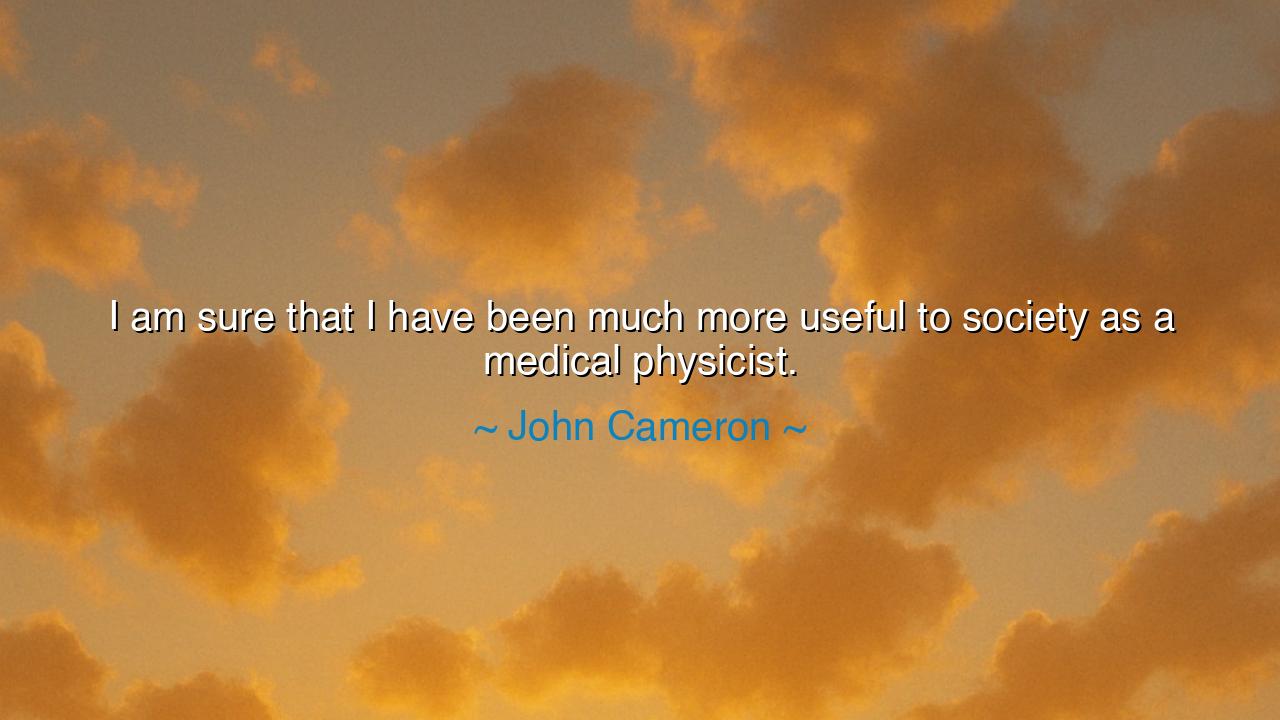
I am sure that I have been much more useful to society as a






In the humble yet profound words of John Cameron, there echoes a truth that speaks not of glory but of service: “I am sure that I have been much more useful to society as a medical physicist.” These words are not adorned with pride, yet they carry the weight of a life spent in quiet dedication to the betterment of humankind. Cameron, a pioneer in the field of medical physics, reminds us that greatness does not always shine through fame or recognition — it often resides in the unseen hands that build the foundations upon which others stand. His statement is a declaration of purpose fulfilled, a reflection of a man who measured success not by wealth or applause, but by usefulness, by the tangible good his work bestowed upon the living.
The meaning of this quote lies in its timeless message of service over self, of contribution over acclaim. In a world that often celebrates the visible — the politician, the performer, the athlete — Cameron’s words turn our eyes toward the invisible builders of progress: the scientists, the healers, the teachers, and the innovators who labor in silence to heal, to enlighten, to sustain. His reflection is not a boast, but a meditation on the essence of purpose — the realization that true fulfillment is born not from personal advancement, but from the enrichment of others. To be “useful to society” is, in the wisdom of the ancients, the highest calling of a human being, for it aligns one’s labor with the eternal rhythm of creation itself.
The origin of these words can be found in Cameron’s life and legacy. As one of the founders of medical physics as a distinct profession, he devoted his life to merging the precision of physics with the compassion of medicine. His work transformed radiation from a destructive force into a tool for healing, helping to shape technologies that diagnose disease and save lives. Yet he began his journey not as a seeker of glory, but as a servant of discovery. Through teaching, research, and innovation, he opened paths that others could walk — training generations of physicists and doctors who would carry his mission into the future. His certainty that he was “useful to society” came not from pride, but from the calm assurance of a craftsman who has placed his stone in the cathedral of human progress.
Consider the example of Marie Curie, another soul who embodied the same spirit of selfless contribution. Like Cameron, she worked in the realm where physics meets medicine, uncovering the secrets of radiation not for fortune, but for the advancement of healing. Her discoveries, born of hardship and sacrifice, gave birth to new fields of science and medicine. Yet she never sought acclaim. Her notebooks, still radioactive to this day, bear witness to a life consumed — quite literally — in the service of others. So too, Cameron’s life reminds us that usefulness, not recognition, is the true measure of greatness. Both lived the truth that the most enduring legacy is not fame, but impact — the quiet transformation of suffering into hope.
There is an emotional depth in Cameron’s words that speaks to the heart of all who wonder about the worth of their labor. He does not claim that his life was glamorous or heroic in the worldly sense. Instead, he speaks with the humility of one who knows that the power of science, when joined with compassion, becomes a sacred calling. To be a medical physicist — one who brings healing through knowledge of invisible forces — is to participate in a divine balance between intellect and mercy. In the same way, every human soul, whatever their craft, has the potential to become useful in this grand design — to use their gifts not for self-praise, but for the healing of the world around them.
The ancients taught that virtue is the harmony of purpose and action — to know one’s place in the greater order and to live in accordance with it. Cameron’s statement reflects that virtue perfectly. He found his purpose not in competition, but in contribution. His wisdom teaches us that usefulness is not measured by the magnitude of one’s deeds, but by the sincerity of one’s intent. A small act done with a pure heart — the teaching of a student, the comforting of a patient, the creation of a tool that saves one unseen life — may carry more weight in the moral universe than the loudest gesture of fame.
The lesson we must take from his words is this: live not for applause, but for service. Seek to be useful, and in that usefulness, you will find meaning that cannot fade. Whether your labor is of the hand or the mind, dedicate it to the good of others, for in doing so, you become a part of something eternal. Ask yourself not, “How great can I become?” but rather, “How much good can I do?” Let your actions, like Cameron’s, leave behind ripples that extend far beyond your lifetime — ripples of healing, knowledge, and hope.
So let the teaching of John Cameron endure as a guiding flame for all who seek purpose: true worth lies not in fame, but in usefulness; not in being seen, but in serving well. In every act of labor done with love, there is a spark of immortality. To live with this understanding is to live wisely, to die peacefully, and to leave the world better than you found it. For in the end, the greatest of all human honors is to be remembered — not as one who was admired, but as one who was useful.






AAdministratorAdministrator
Welcome, honored guests. Please leave a comment, we will respond soon